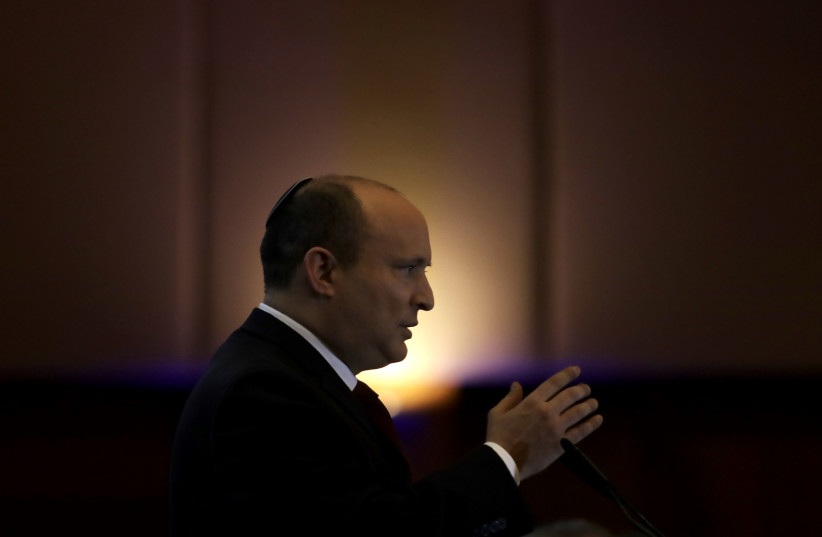Presidents of the United States throughout history have attempted to build themselves on the international stage, which was then reflected back home in how their leadership was perceived by their electorate.
Weaker presidents in particular have used that strategy. Presidents who did not control Congress and could not advance their domestic agenda turned to global issues, in which they could make more of an unfettered impact.
Israel now has arguably its most American prime minister ever in Naftali Bennett, and perhaps he has learned from politics in the country of his parents.
He has by far the smallest faction of a prime minister in Israel’s history, with only six seats, and the smallest possible majority in the Knesset, with 61 to 59.
But he is prime minister, and no one can take that away from him any time soon. As Israel’s leader, his colleagues are now the leaders of countries around the world, like Russian President Vladimir Putin and German Chancellor Olaf Scholz, more so than Yomtob Kalfon, Nir Orbach and other Yamina MKs in the Knesset.
When Bennett first spoke to the world as prime minister, he was somewhat apologetic, as if he knew he didn’t really belong in their company. He told the United Nations General Assembly in September that his government came to power thanks to a “political accident.”
It has now been more than a year since the March 23, 2021, election that helped bring to power Bennett, who turns 50 on Friday, and sources close to him say that he has stepped out of his much more experienced predecessor Benjamin Netanyahu’s shadow and matured as a leader.
At first, there were gaffes like Bennett calling the parents of critically wounded IDF soldier Barel Shmueli without knowing his name.
Since then, Bennett has dealt with two waves of the coronavirus, passing two state budgets and multiple coalition crises at home. The opposition has gotten under his skin, most notably when he physically charged heckling Likud MKs during a vote on providing electricity to illegally built Arab homes. Passing bills has proven difficult, but his government is not in danger of falling.
By contrast, on global issues, Bennett has looked more comfortable. He helped bring home the Oknin couple from Turkey, made historic visits to Abu Dhabi and Bahrain, improved ties with Egypt and Jordan and has now become the only international figure trusted by the leaders of Russia and Ukraine to mediate between them.
Sources close to Bennett admitted on Thursday that his mediation is not only altruistic in helping end a bloody war and strategic in helping advance Israel’s national interests. The potential political gain for himself is not completely off his mindset.
“Part of the strategy is for the public to see proper management, which leads the public to respect the persona,” a source close to Bennett said.
Whether Bennett’s mediation effort will succeed matters less politically. An Israel Democracy Institute poll found that 30% of Israelis think that there is a good chance that the mediation effort will help end the fighting in Ukraine, while 54% disagree and 16% don’t know.
Bennett’s summit in Sharm e-Sheikh with Egyptian President Abdel Fattah al-Sisi and Abu Dhabi Crown Prince Mohammed bin Zayed Al Nahyan this week also emphasized to Israelis that Bennett has become a global figure, in addition to the message the meeting was intended to send to the countries finalizing the Iranian nuclear deal.
Likud leadership candidate Nir Barkat is using the exact same strategy. He has been in Washington meeting senators and congressmen for two weeks to show Likudniks that he can take Netanyahu’s mantle as a Likudnik who knows how to talk to the world.
It is no wonder that since becoming prime minister, Bennett has spent more time in Moscow than in Metulla, more time in Sharm e-Sheikh than in She’ar Yashuv.
IN FACT, Bennett has spent almost zero time on advancing his own Yamina Party, with no election on the horizon, leading to speculation he will retire from politics when it comes time for a rotation in the Prime Minister’s Office in August 2023. By contrast, Defense Minister Benny Gantz hosted a party event this week, and Foreign Minister Yair Lapid, Justice Minister Gideon Sa’ar and Transportation Minister Merav Michaeli have also held recent events to advance their parties.
Sources close to Bennett downplayed his political inactivity. They said other prime ministers also refrained from internal politics in the middle of their terms, that Bennett is genuinely too busy, and he has no plans to quit politics in less than a year and a half.
The one political step he would love to take would be to close a deal on opposition MKs defecting to the coalition. A resumption of talks between the prosecution and Netanyahu on a plea agreement could be the harbinger of such political upheaval.
Passing another state budget is the next step toward proving the current government’s staying power. Finance Minister Avigdor Liberman wants to pass the budget months ahead of time to prove a point – in the cabinet in June, and in the Knesset in September.
Liberman met with the heads of the Knesset Finance and Economy committees this week to start briefing them about the budget being drafted. He intends to meet party leaders one by one next week to start talking to them about including reforms to their liking in the budget, in return for helping pass more controversial clauses.
Meanwhile, polls show a slight gain for Yamina. A Channel 12 poll that not too long ago had Yamina teetering on the electoral threshold now has the party at seven seats. A Channel 13 poll found Bennett seen as second most fit to be prime minister after Netanyahu.
The most recent poll, in the Israel Hayom newspaper on Tuesday, was less positive for Bennett on both of those questions. Nevertheless, his associates are convinced that Yamina will soon hit double figures, and they believe his new global leadership role will bring that goal to fruition.
“People have gotten used to saying the words ‘Prime Minister Naftali Bennett,’” a source close to him said. “It’s not strange anymore, even for people who knew no one else as prime minister besides Bibi. When you see Bennett go to Putin and then to Scholz, it has an impact.”

